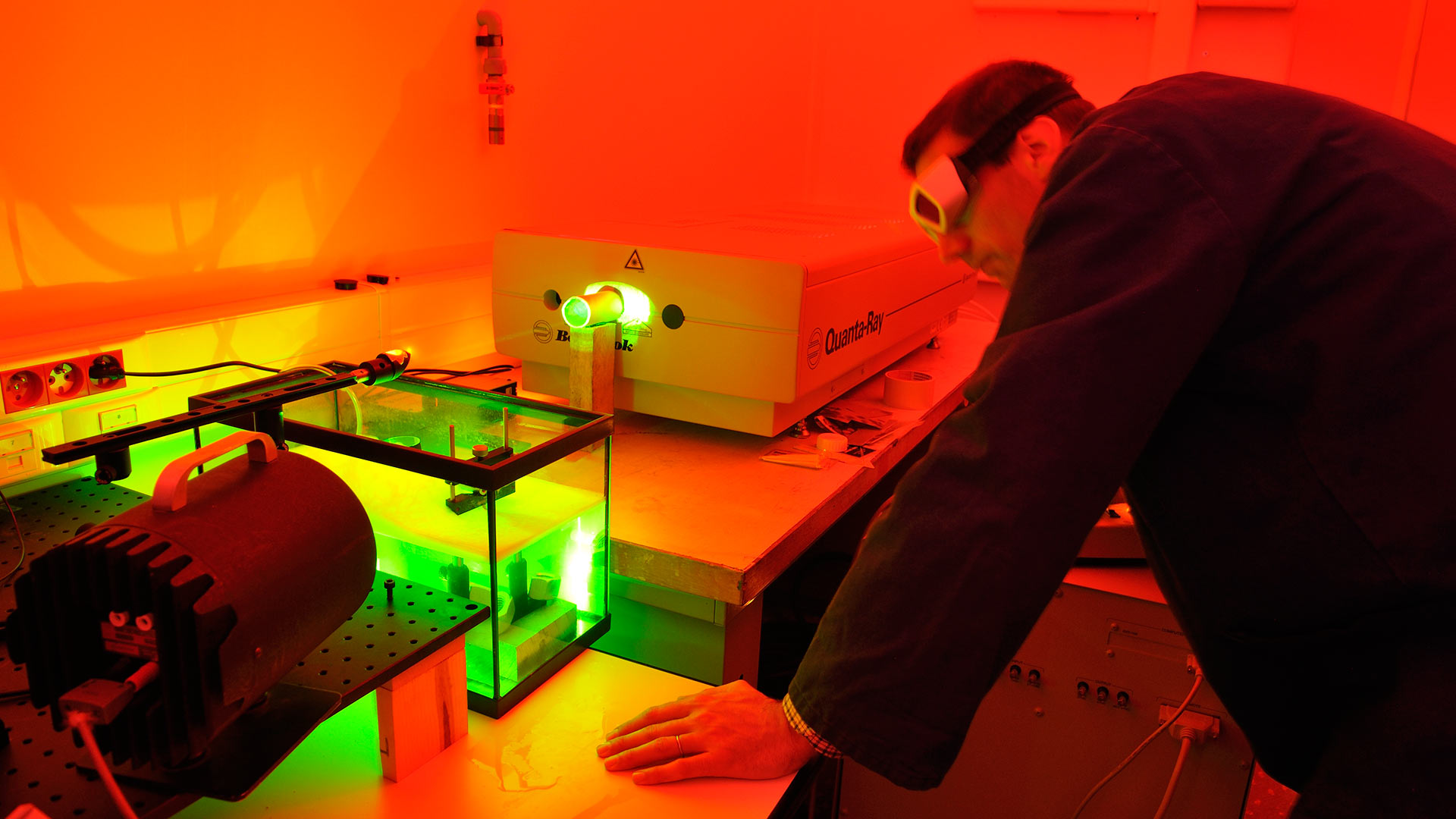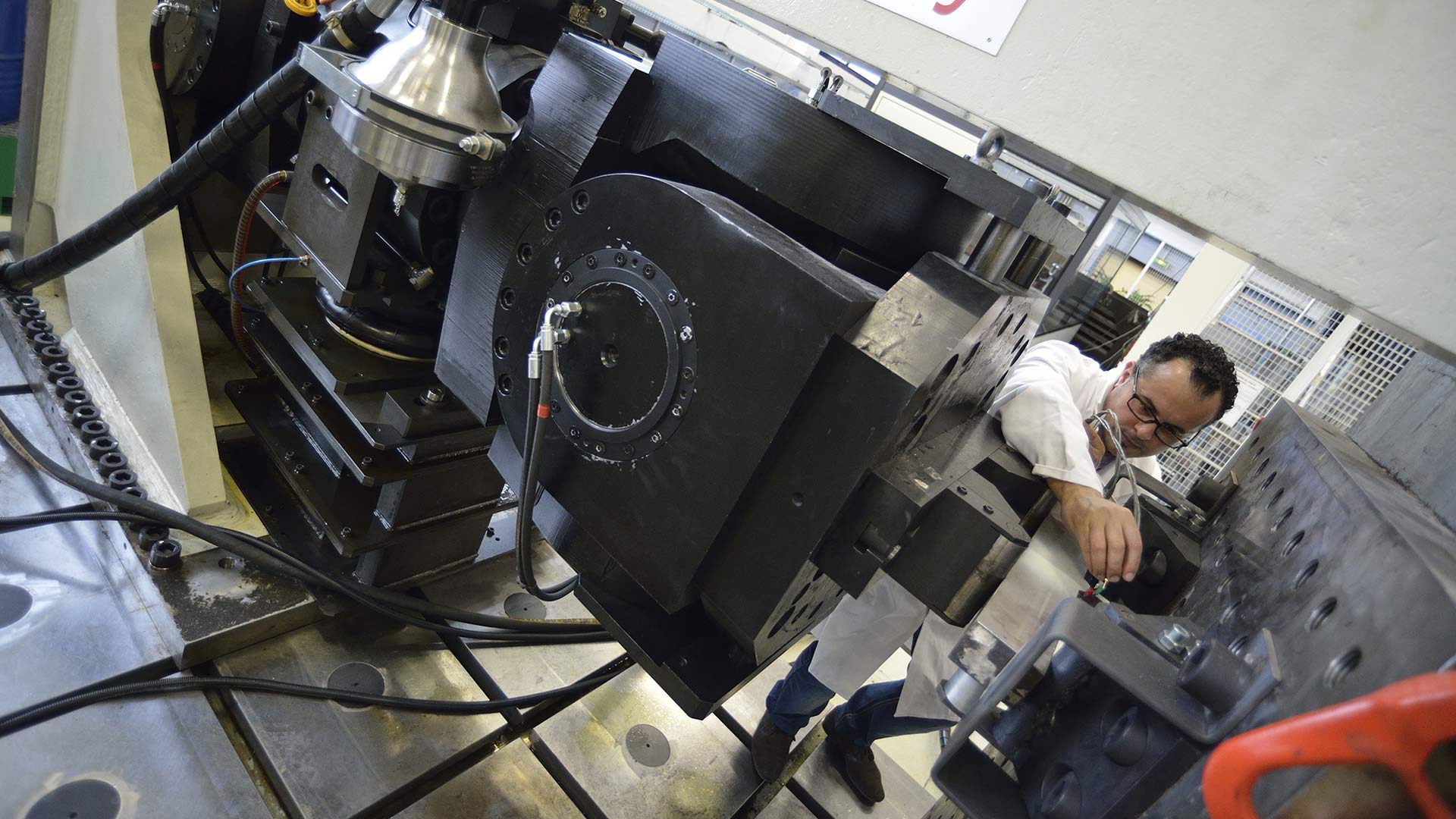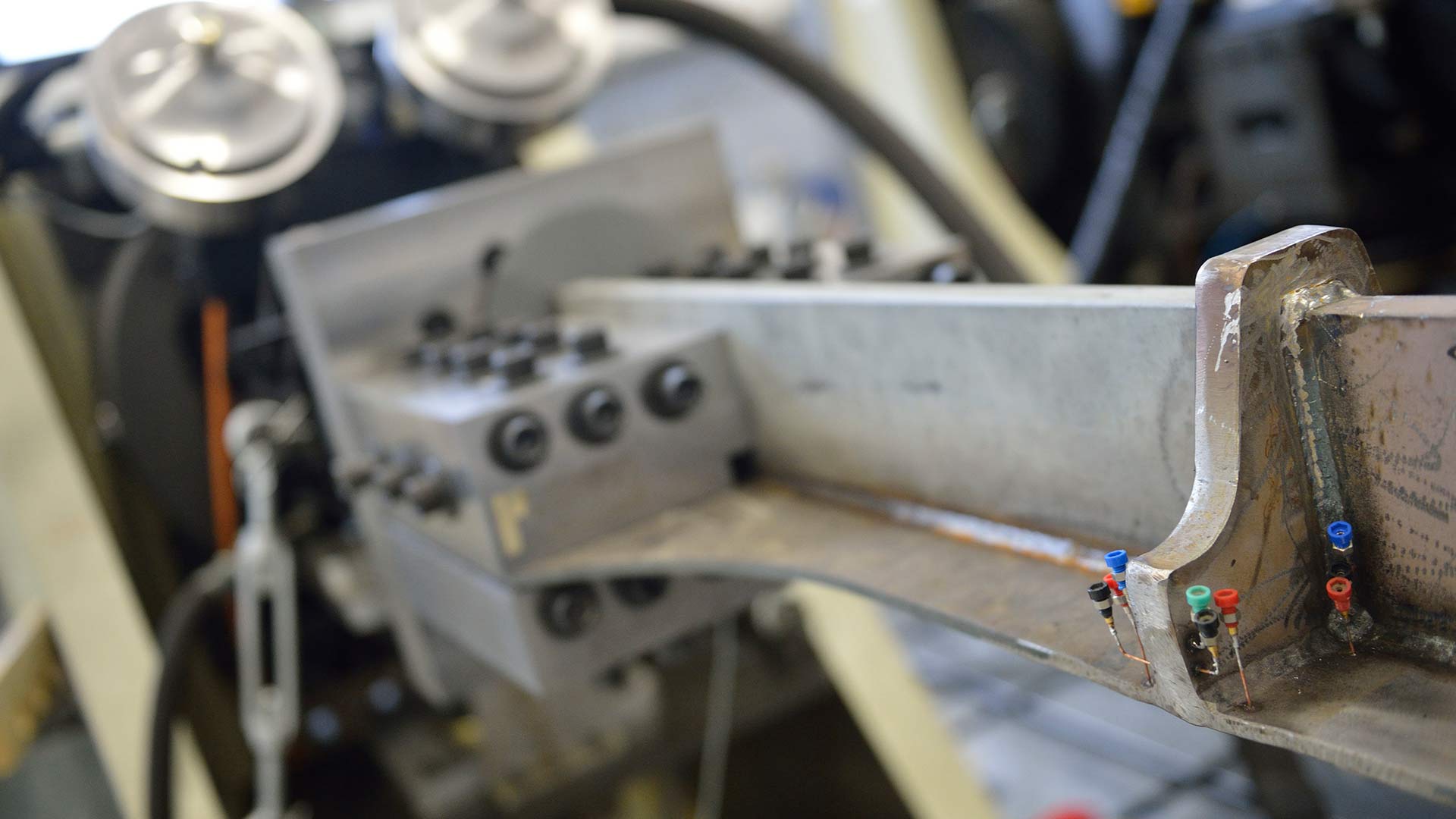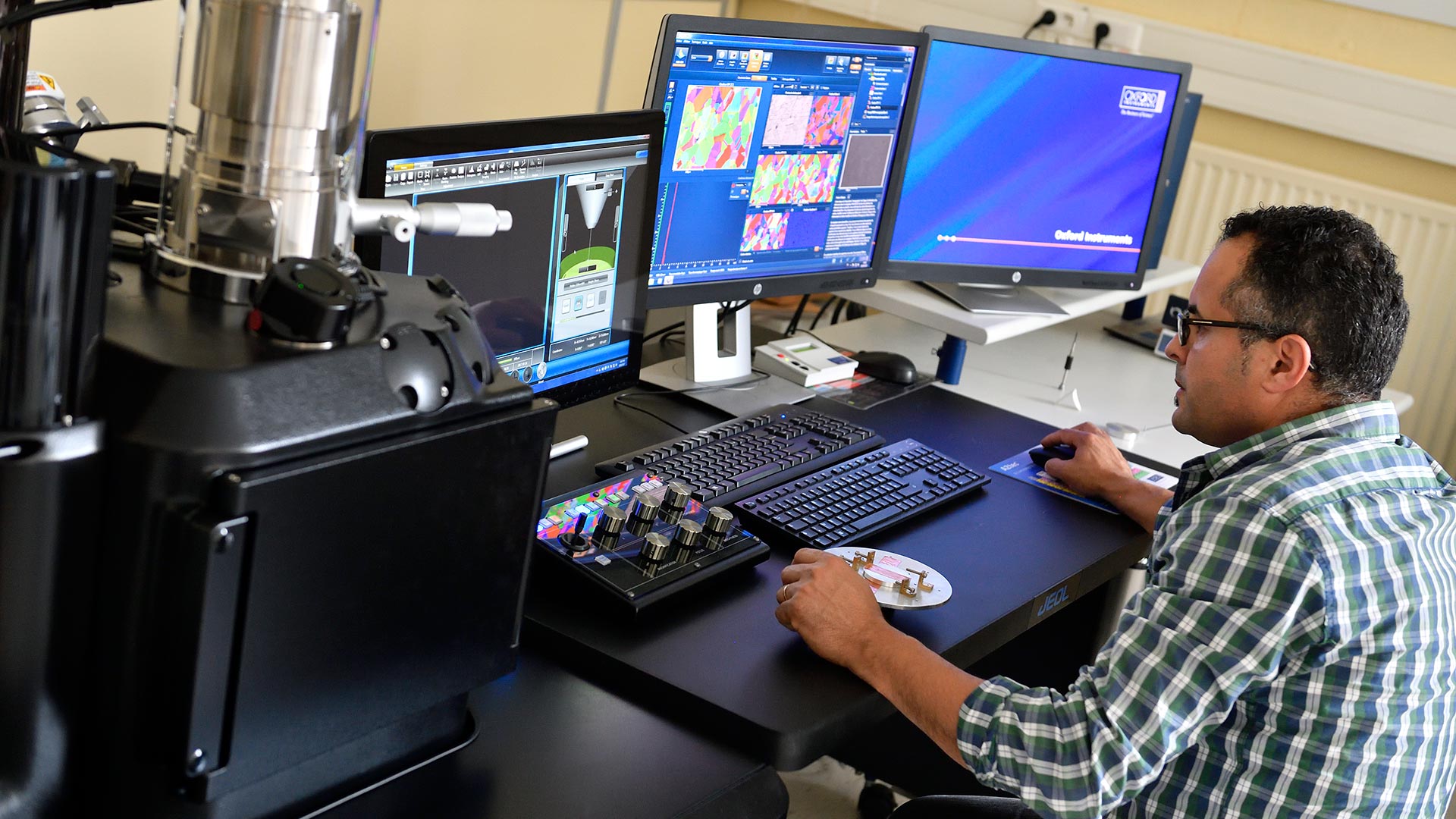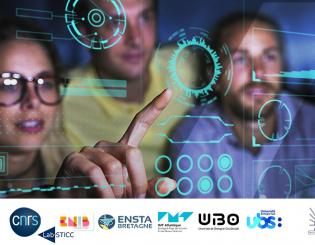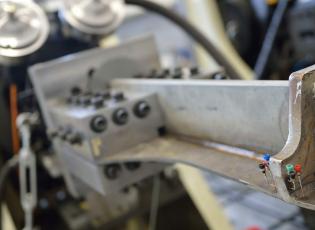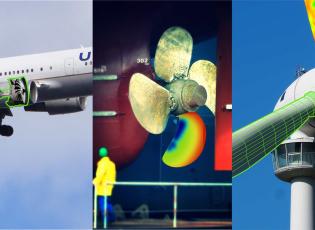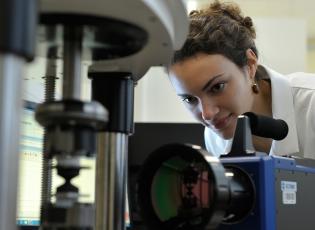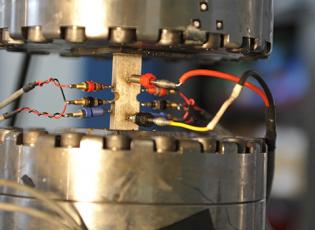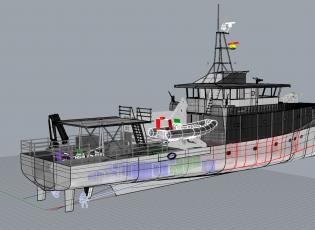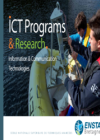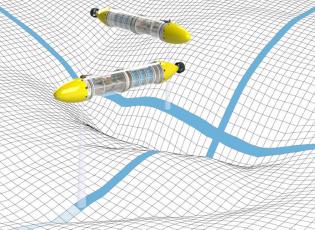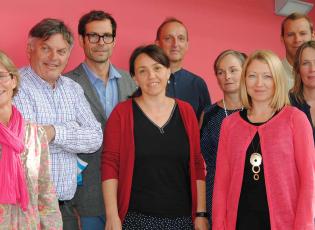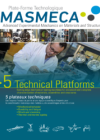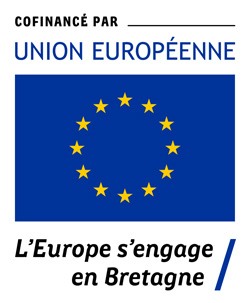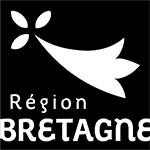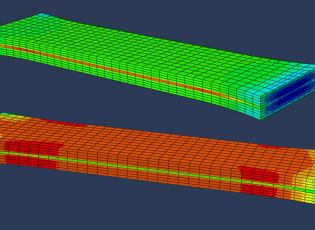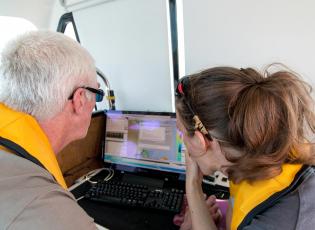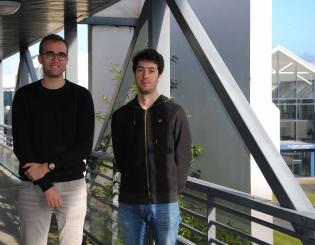
PTR5: Material behavior and durability
Research areas
- Fatigue and self-heating of materials and structures (metals, composites and organic materials).
- Behavior and fatigue of active materials (piezoelectric or shape memory materials).
- Thermal and marine aging of organic materials.
- Non-linear behavior of heterogeneous materials.
This applied research, while addressing fundamental scientific questions, is conducted with European manufacturers from a broad range of sectors, particularly automotive, aeronautics, energy and materials suppliers.
Expertise
- Theoretical approach: behavior laws, modeling of irreversible processes and multiscale modeling.
- Experimental approach: a test for every scale; field measurements for rapid characterization; developing new tests.
- Numerical approach: implementation of behavior laws, numerical multiscale approaches, design and diagnostic tools.
Keywords:
Fatigue, aging, fatigue resistance, modeling, tests.
Led by ENSTA Bretagne (Institut de Recherche Dupuy de Lôme1) with Naval Group and Safran, including the P’2 Institute, the “Self-Heating” chair has been accepted by the Agence Nationale de la Recherche (ANR) (National Research Agency). For four years, the teams will work on the heat signatures of materials. The aim: predict their in service performance and fatigue life.
- Total budget : 2 050 000€ financed by the ANR and the Safran and Naval Group industrial groups
- Period : 4 years. It will begin officially on 1 December 2020.
- Dedicated team : 8 PhDs, 4 post-doctorates and 13 research supervisors
- Title : Characterization, modeling and rapid prediction of the polycyclic fatigue properties of materials based on thermometric measurements
- Objective : The rapid prediction and determination of the polycyclic fatigue properties of materials based on the study and modeling of the heat signature of damage mechanisms.
This research program is based on the “self-heating” method, that is to say, measuring the temperature of a material in precise experimental conditions. This technique enables the prediction of weak points, which can then be factored into design office calculation codes and thus delay or even avoid damage when designing a ship, submarine or plane. The Safran Group and Naval Group both wish to develop and extend this scientific “heat measurement” (or self-heating) approach to all the materials used in their respective applications, and are interested in the parameters at play in the fatigue of their materials (temperature, manufacturing process, type of load, surface preparation etc.).
Lire l'article complet sur le projet de recherche RESISTANCE portant sur la caractérisation des contraintes dans les composants structurels en acier de forte épaisseur.
Un projet mené en partenariat avec Naval group dans le cadre du laboratoire commun Gustave Zédé.
Fatigue of a marine thruster made by additive manufacturing.
This project carried out with IFREMER focuses on durable and flexible polyamide moorings for marine renewable energy applications.
Fatigue design thermomechanical research work for 3D-woven composite materials in aeronautical applications; rapid determination of the high cycle fatigue properties (based on self-heating testing under cyclic loadings) of metal alloys for turbojets.
The fatigue design thermomechanical research work focuses on parts made from different materials (polyurethane foam or glass fiber reinforced thermoplastics).
contact
PTR3: Structures, fluids and interactions
Research focus
- Naval hydrodynamics and the study of the response of structures in interaction with fluids.
- Characterization and modeling of the response of metal and composite materials and structures, under dynamic loads.
- Studies and modeling of impact and explosion phenomena in complex environments.
Expertise
- Hydrodynamic impact, experimental approach and modeling
- Numerical methods involving a large number of variables, instability prediction and bifurcation flow monitoring (low Reynolds number)
- Behavior model development to describe the static (forming) and dynamic response of complex continua
- Experimental demonstration of specific transient behaviors
- Dynamic measurement of fields of state variables
- Using simulation models and tools reliable enough to process all couplings while limiting the calculation time.
Keywords
Modeling, numerical simulation, experimental mechanics, materials and structures, dynamics/shocks/impacts, fluid-structure interactions.
Explosive devices pose a significant threat to property and people. The explosion generates significant thermal effects, a blast wave, and the scattering of fragments at initial speeds of about 2,000 m/s.
In order to protect against these effects, the solution is to interpose a physical barrier between the charge and its potential targets. Liquid foams (dispersion of a liquid phase within a gaseous phase) are excellent materials for attenuating sound waves, blast waves, and for decelerating projectiles.
The main aim of the COBADI project is the simple, fast in situ sizing of a two-phase protective barrier in accordance with the parameters relating to the threat (blast wave and hypervelocity fragment properties) and the liquid foam. The study aims to establish a substantial experimental database to describe the behavior of foams over a wide range of parameters and thereby be able to design an optimized foam for a targeted threat.
Probabilistic analysis of the nonlinear rolling of ships subjected to irregular swell [AID funding, in cooperation with Ecole navale]. This project aims to develop new methods to predict the risk of ships capsizing.
The ANR ASTRID MATURATION* project "PROBALCAV" (which stands for cavitating ballistic protection) has civilian and military applications. Its aim is to design an innovative concept for protection against projectiles, based on shock-induced cavitation.
[ANR ASTRID Maturation funding]
Sizing of floating wind turbines reflecting impacts and wave breaking [ANR/France Energies Marines funding]
Parametric optimization of foils; application to Olympic sailing
[Funding by Instituts Carnot ARTS et MERS, with Ecole navale and Ifremer]
Transparent composite protection
[ANR ASTRID funding]
Survivability of Structure Against Energy deposition
[ANR ASTRID funding]
Materials providing protection against blast effects (MAtériaux de Protection contre les effets de Souffle)
[ANR funding]
14 publications in peer-reviewed journals
(Key figures 2021)
contact
PTR2: Multi-material assemblies
Research areas
- Study and optimize assembly processes, by assembling different types of material, treated with new surface preparations.
- Perform in-core instrumentation of assemblies (FGB, QRS, CIN, etc.) and use original experimental devices.
- Develop sizing tools for adhesively-bonded assemblies and factor in the parameters associated with the bonding processes.
- Characterize long-term strength of assemblies in harsh environments.
- Develop hybrid techniques (e.g. weld-bonding) for multi-material structures, to achieve high performance in terms of mechanical characteristics.
Expertise
- Assembly instrumentation
- Characterizing the multi-physical properties of materials and the long-term behavior of bonded and welded assemblies
- Multiscale modeling of physical phenomena during and after assembly, until failure
Keywords
Assembly, Bonding, Welding, Sintering, 3D printing, multi-material
Mechanical modeling, a performance prediction tool for assembling innovative structures by bonding
Bonding is gaining ground across the industrial spectrum for its many advantages in terms of streamlining, combining different types of materials or assembling small structures. These assemblies need to be optimized via modeling to achieve precise performances and lower the carbon footprint of certain activities, comply with new standards or branch out into new markets (new materials, new energy sources, etc.).
With that in mind, manufacturers are calling on researchers at the IRDL laboratory’s “multi-material assemblies” research hub, who particularly study the long-term strength of the adhesive and multi-material structure sought, come up with innovations in assembly processes and develop hybrid techniques.
“In the laboratory, we reproduce the industrial assembly process to be studied and perform tests under variable mechanical loading to develop models for predicting how the structure will behave depending on the stress it is being put under,” explains David Thévenet.
Development of a multi-material bonded structural assembly providing ballistic protection (2018-2021; in collaboration with the PTR3).
Thermal and mechanical characterization of aluminum/steel multi-material assemblies for vehicles (Funded by Bpifrance and Stellantis)
Characterization and modeling of the behavior of thick bonded interfaces (funded by Institut Carnot ARTS, the Brittany Region and Finistère Département)
The high-elongation adhesives used as thick applied seals are currently used to serve a structural assembly purpose (e.g.: ship hull, wind turbine blade, etc.).
This requires the implementation of suitable sizing methods that can factor in the behavioral complexity of such systems. Original tools have thus been developed in the context of the collaborative project COCOA (Brittany Region/Carnot Arts) involving the LAMIH (joint research unit/UMR CNRS 8201) and CETIM. Modeling of the damage of the bonded interface is compared to the findings of cracking tests under complex loading.
Development of a technological test for validating the behavioral modeling of an adhesive subject to impact loads (funded by SAFRAN Composites - collaboration with PTR3)
Durability of bonded structural repairs (funded by AID)
Analytical and digital modeling of the lateral buckling of offshore pipelines (Funded by the Brittany Region)
13 areas of innovation have been determined for this European project that brings together 37 partners from 11 countries.
The team leads the work carried out on the durability of bonds between a composite module and a metal structure and on the setting up of a high cycle fatigue design calculation chain for steel thrusters made using additive manufacturing, with large-scale validation testing (2017-2020 with PTR 2 and 5).
contact
Cutting-edge research for real-world applications
This applied research is conducted in 3 main subject areas: mechanical sciences, information & communication science & technology and humanities for engineers.

Mechanical sciences
UMR CNRS 6027 IRDL (Institut de Recherche Dupuy de Lôme : ENSTA Bretagne, UBS, UBO and ENIB), member of Carnot "ARTS" Institute

Information and communication technology
UMR CNRS 6285 Lab-STICC (ENSTA Bretagne, IMT Atlantique, UBO, UBS and ENIB)

Humanities and Social Sciences
EA FoAP (Formation et Apprentissages Professionnels: ENSTA Bretagne, Cnam Paris and AgroSup Dijon)
The research teams work within national and international industrial chairs and laboratories, in conjunction with other engineering schools, universities, national research bodies (particularly the French National Center for Scientific Research/CNRS) and the school’s longstanding industrial partners.
ENSTA Bretagne’s research center is constantly expanding. It has a nearly 300-strong workforce, divided into some fifteen thematic teams. It operates across six buildings (7,500 sq.m.) and boasts significant test facilities in the mechanical sciences, pyrotechnics, IT, cybersecurity and robotics. A 7th building is currently in the pipeline. This will harbor a vast test tank for research on marine and airborne drone systems.
These developments stem from a research strategy focusing on key issues for the future, which has secured financial backing from Europe, the French State, the Brittany region and Brest Métropole. 6 scientific projects involving ENSTA Bretagne teams will receive funding from 2021 to 2027 via the contract for regional development between the French State and the Brittany region (CPER) worth €9.85m in total, on such themes as naval design, observation of the oceans, drones and space technologies, maritime cybersecurity, industrial digitization, materials for the energy transition and exploratory robotics.
The MASMECA Technology Platform
Structured around 5 technical platforms, the MASMECA (Advanced Experimental Mechanics on Materials and Structures) technology platform links research centers with local socioeconomic and industrial organizations, promoting vigilance and transfer of technology to businesses.
MASMECA provides industrial firms with access to its experimental facilities and skills with the aim of:
- promoting transfer of technology and techniques;
- meeting businesses’ testing needs and contributing to innovation;
- developing partnerships between research centers and socioeconomic and industrial stakeholders;
- expanding the platform’s resources.
Equipment for high-speed loading tests
- Hopkinson Bars
- Taylor Gun
- Shock tube
- Shock machine with retractable tank for water impact testing
- Spectra-Physics Quanta-Ray Pro 350 pulsed laser
- IDIL Photonic Doppler Velocimeter (maximum speed 20km/s, 1550nm laser)
Loading samples and structures in controlled mechanical and environmental conditions
- 3 servo-hydraulic tension-compression testing machines
- 4 electro-mechanic testing machines
- 2 servo-hydraulic tension-compression/torsion testing machines, including a Tema Concept machine
- Tri-axial servo-hydraulic test bench (maximum force 2500kN) (see Photo 3)
- Vibrophore and rotating fatigue machine
- Ovens and thermal and induction heat test chambers
Evaluating the effect of microstructure on materials’ mechanical behavior
- Instrumented micro- and nano-hardness testing machines (formerly Anton Paar TriTec SA)
- METRAVIB DMTA machine with IR measurement
- Differential scanning calorimeter (DSC)
- Electrodynamic testing machine (±3.2kN, ±24N.m)
- Netzsch 402P differential dilatometer
- Shimadzu TGA-50H thermogravimetric analyzer
- Cryogenic chamber
Cutting-edge equipment for measurement and analysis
Motional and temperature field measurement equipment:
- 2 infra-red FLIR SC7000 cameras (see Photo 6)
- 2 GOM ARAMIS stereo digital image correlation systems (see Photo 7)
- FASTCAM high-speed camera and 3 CCD cameras
- X-ray diffractometer (DRX) and other equipment associated with this observation method, including a dosimeter
Analysis and observation equipment:
- 2 optical microscopes (including one 3D digital microscope), scanning electron microscope, etc.
- 1 scanning electron microscope and associated equipment, including Discotom, back-scattered and secondary electron detectors, EDS and EBSD analysis systems, and on-site tension-compression test bench
- High-frequency signal acquisition equipment
Production of samples and parts for experimental set-ups
- SABRE 1000 vertical machining center,
- Alcera Gambin milling machine
- Colchester CNC lathe
- Weiler Primlus CNC lathe and Gallic 16N conventional lathe
contact
